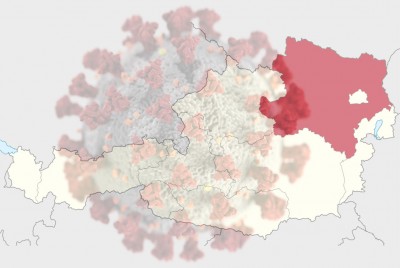Coronavirus in Lower Austria: Update
The coronavirus disease (COVID-19) has also hit Austria's largest federal state in terms of area, Lower Austria, hard and the number of infected cases is constantly increasing. Below we look at the official data of the Office of the Provincial Government of Lower Austria, and analyze the structure of deaths and infections both provincially (Bundesland) and by district (Bezirk). Questions and answers on the novel coronavirus (2019-nCoV) below.
 Updated coronavirus information and current data of the federal state of Lower Austria. / Picture: © Vindobona.org (Collage of Photos)
Updated coronavirus information and current data of the federal state of Lower Austria. / Picture: © Vindobona.org (Collage of Photos)
What is the situation in Lower Austria?
The Office of the Provincial Government of Lower Austria and the Lower Austrian Medical Crisis Staff regularly inform about the current case numbers and other key figures on the Covid-19 virus pandemic in Lower Austria.
You will find the current data of the federal state of Lower Austria (population: 1,677,542) below.
As of Monday, July 20, 2020, at 9:00 p.m. (local time) the state of the coronavirus infections in Lower Austria is as follows:
- Infections: 3,193 COVID-19 infections have been confirmed by the Office of the Provincial Government of Lower Austria, an increase of 326 compared to the previous update.
- Inpatients: Currently no information is available on how many inpatients of COVID-19 are being treated.
- Phone calls: Data regarding this topic is not provided any longer.
- Tests: To date, 137,720 COVID-19 tests (nose and throat swabs) have been performed, according to the Office of the Provincial Government of Lower Austria.
- Tests that are still under investigation: Currently no information is available on how many tests are still under investigation and therefore still open.
- Recoveries: A total of 2,899 COVID-19 patients have recovered.
- Deaths: To date, there have been 105 confirmed COVID-19 death. (This marks an increase of 5 death compared to the previous update.)
Current data at district level has recently ceased to be provided by Lower Austria.
The latest confirmed positive cases in Lower Austria are distributed among the districts as follows:
Amstetten (271), Baden (118), Bruck an der Leitha (68), Gänserndorf (72), Gmünd (12), Hollabrunn (28), Horn (39), Korneuburg (144), Krems-Stadt (33), Krems (133), Lilienfeld (40), Melk (155), Mistelbach (114), Mödling (151), Neunkirchen (168), Scheibbs (99), St. Pölten (245), St. Pölten City (77), Tulln (144), Waidhofen an der Thaya (61), Waidhofen an der Ybbs City (22), Wiener Neustadt (59), Wiener Neustadt City (36) and Zwettl (65).
Additions to the available data:
First official deaths in Lower Austria
According to the Landeskliniken-Holding, a 96-year-old woman who had tested positive for the corona virus died on Friday, March 20, 2020, at the Landeskliniken Melk.
Coronavirus: Further measures in Lower Austria - Testing to be doubled
The government of Lower Austria declared today that it will follow the federal guidelines and will increase the number of tests considerably.
"The number of tests per day will be doubled to about 1,000." announced State Governor Johanna Mikl-Leitner and State Councillor Ulrike Königsberger-Ludwig today, during a visit to the coordination meeting of the Lower Austrian state medical staff.
In Lower Austria, the medical planning and structural measures in connection with COVID-19 are adapted on a daily basis.
In order to be able to react immediately and in the best possible way to changes in the situation, the crisis team of the Lower Austrian Provincial Health Agency regularly coordinates with the responsible persons in the five health regions.
"The basis for our coordinated approach is a defined step-by-step plan that enables us to adapt our capacities to the requirements according to the development of the infection," says Konrad Kogler, head of the crisis team and member of the board of directors of the NÖ LGA.
One of the first measures was the timely definition of the Provincial Hospital in Melk as the location in Lower Austria where those positively tested patients who require hospital care are treated.
In view of the increase in the number of COVID-19 cases, further clinics have now been defined in all regions of the province, which will subsequently take over the treatment of COVID-19 patients.
This measure is an important component of regional planning, which aims to ensure that patients are treated as close to home as possible.
After weighing up all medical and structural conditions, the decision was made in favour of the state clinics in Hollabrunn, Lilienfeld, Neunkirchen and Waidhofen/Thaya. Initially, the LK Lilienfeld and Neunkirchen started operations. The other clinics followed within a few days according to capacity requirements.
The decision has been made in close coordination with the respective clinic management, emphasizes Helmut Krenn, who, as a member of the executive board of the Lower Austrian State Health Agency, leads a second crisis team. "The daily alternating deployment of our two management groups ensures continuous readiness," explains Krenn.
Several factors were decisive for the selection of the five additional clinic locations, explains Markus Klamminger, Director of Medicine and Care at the NÖ LGA. "The defined clinics have the optimal supply size for this deployment and also have sufficient capacities in terms of personnel and structure, including in the intensive care area, to be able to react in the best possible way in this phase of the requirements".
A total of up to 960 patients can be treated in the five clinics through a gradual increase in capacity.



